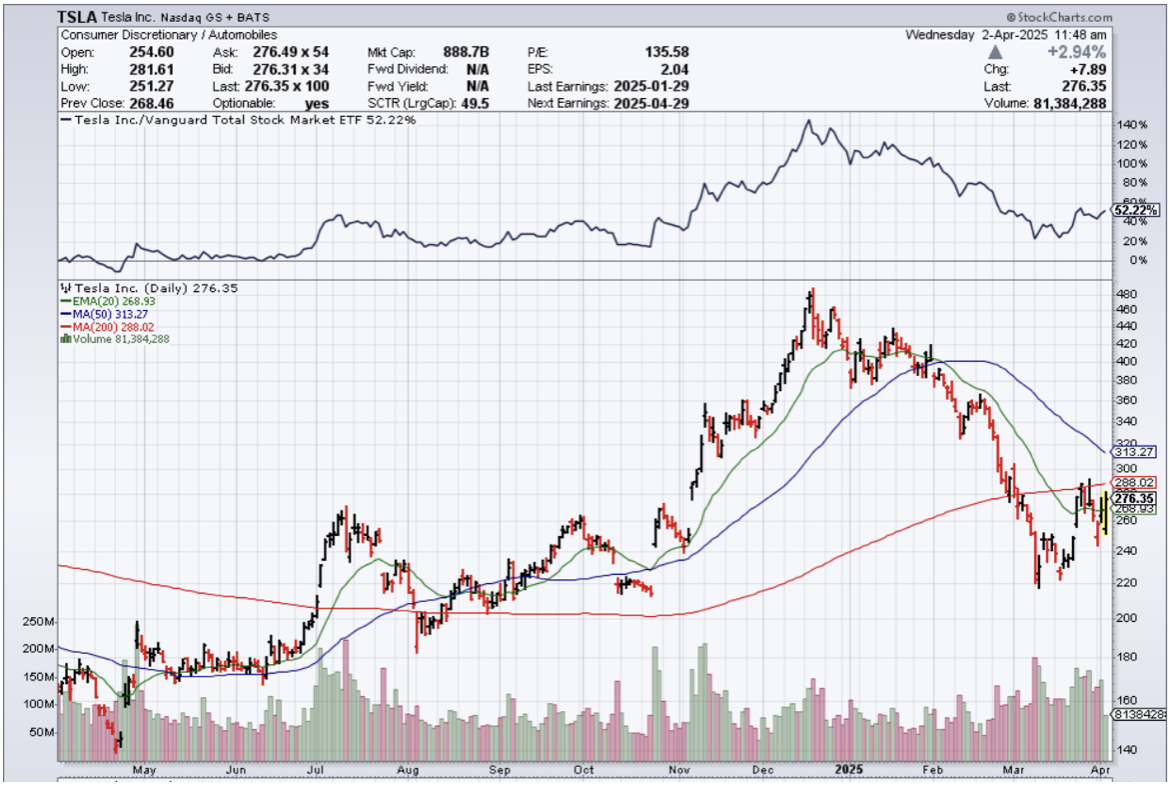Mad Hedge Technology Alerts!
Mad Hedge Technology Letter
April 2, 2025
Fiat Lux
Featured Trade:
(THE TRUTH ABOUT TESLA THE BUSINESS MODEL)
(TSLA), (DOGE)

It is becoming more than obvious that Elon Musk’s venture into politics is hurting his business as Tesla dishes us some bad results from the latest quarter.
The amount of global deliveries failed to meet the mark and demand has been sapped for a variety of reasons.
Before getting more into it, I must say that European and American EV makers face an existential test against the Chinese and this challenge isn’t a decade or 2 off – it is right here and right now.
China has used its technological prowess to quickly rise up through the value-added supply chain and they now make a smartphone almost as high quality as an iPhone but for just a fraction of the price.
If we extrapolate this concept further out in terms of directional trajectory, the Chinese will most likely reproduce a similar outcome in aviation, humanoid robots, AI, semiconductor chips, automation and every leading tech sub-sector.
Musk certainly knows this which is why he is pivoting to robo-taxis and humanoid projects that are making headway, but not ready for commercial use.
The pie shrinking and the Chinese grabbing larger pieces of it is why Tesla only reported a paltry 336,681 deliveries versus 390,342 estimated.
This marks the worst quarter for deliveries since the second quarter of 2022.
The refreshed Model Y went on sale globally in March, which could be a reason for depressed demand for its top-selling vehicle.
Tesla sales have been stalling across most of its global territories. Earlier this week, Tesla registration data in key European regions fell in March, another sign that sales are continuing to slide in one of its key markets as Tesla's brand has also taken a backseat to Elon Musk’s political foray.
In France, only 3,157 Tesla EVs were registered, down 36.8% from a year ago. Norway saw only 2,211 registrations, down 63.9%. Sweden’s tally of 911 was only down 1%.
Tesla’s registrations are a close proxy for sales, which the company only reports quarterly and does not break out by region.
Another worrying trend that I must bring up is the rapid increase in political violence against Tesla products which is quickly muddying the prestigious brand.
Consumers simply won’t feel safe to buy or drive around in a Tesla if there is a good chance it will get blown up or vandalized.
It would be a good idea for Tesla if Musk clarified his role in running the Department of Government Efficiency (DOGE) and balancing his duties with Tesla.
Even if he does clarify his position, then it could all be for naught with politics quickly dissolving into a zero-sum game in almost every G20 country.
If we step back and look at the broader picture, it appears as if Tesla and Musk have run up to the extreme limit of his personal and political success in the short-term.
Any further meaningful progress will mean Musk “breaks the wall” and radically pivots into something new that will be the catalyst for another leg up in Tesla shares. He will also need federal government cooperation to do this which he didn’t have in the last administration.
Unfortunately, that transition process could become acutely painful for Tesla the business model in the short-term, and any trader looking for a quick mini-dip buy should avoid Tesla for now.
For long-term investors, this is a stock that hasn’t factored in robo-taxi or humanoid technology, and if anyone gets to deploy these two technologies, it will be Tesla and nobody else.
The risks to innovation can be sometimes existential while sting in the short-term, and Musk is finding that out in all its glory.
In the short-term, put on your seatbelt for heightened volatility, and long-term, buy and hold Tesla.
Mad Hedge Technology Letter
March 31, 2025
Fiat Lux
Featured Trade:
(THE TRUTH ABOUT AUTOMATION AND BANKING)
(SQ), (PYPL), (APPL), (AMZN)


